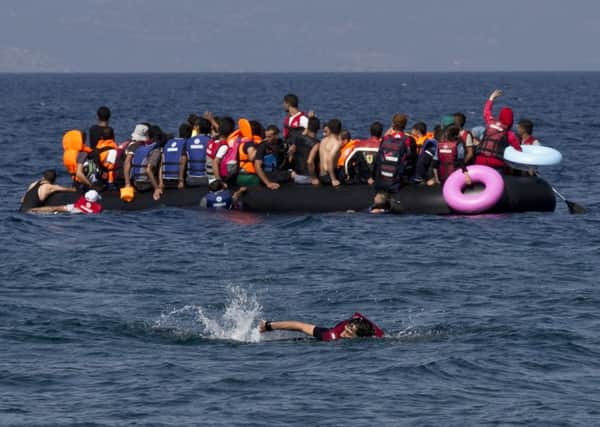Leaders: We cannot pick and choose who we help


The latest macabre flashpoints centred on Greece where, on Sunday, fierce winds resulted in the largest loss of lives in the Aegean since the crisis began.
At least 34 people died attempted the crossing from Turkey to Greece in a ramshackle wooden boat. The dead included 15 children, four of them infants, after the vessel capsized near Farmakonisi, midway between Kos and Samos.
Advertisement
Hide AdAdvertisement
Hide AdYesterday, Greece’s merchant marine minister, Christos Zois, flew to the island to oversee a desperate search of sunkissed waters that have become a place of peril. Over the 72 hours from Friday until Monday morning, the nation’s coastguard revealed it had rescued 1,429 people in 58 incidents off Lesbos, Chios, Samos, Agathonisi, Kos, Symi and Rhodes.
In the midst of this vast, desperate operation, a photograph emerged of a Syrian refugee – a man in his late thirties or early forties – holding a baby in the sea after their dinghy deflated. The child, lying on its back, has its eyes closed. The man is grimacing. It is an image that joins an ignominious gallery.
Such a backdrop to a meeting of European interior ministers can be ignored no longer. These occurrences underscore the need for a plan to prevent further deaths. The continent’s response must be swift and decisive. Crucially, it must ensure every member state plays its part in delivering people to safety, far from the grip of criminal traffickers.
The decision yesterday by Austria and Slovakia to rush to join Germany in reintroducing border checks lends an even greater urgency. Such steps come at a time when the flow of people seeking sanctuary is increasing all the time.
The German vice-chancellor, Sigmar Gabriel, revealed estimates of the number of migrants expected at the country’s gates have been significantly revised. In a letter to party members, he wrote: “Everything points to the fact that we won’t have 800,000 migrants as has been predicted by the interior ministry, but one million.”
Those kind of numbers can only be accommodated if Europe works together. The European Commission proposes distributing 160,000 refugees across 22 EU member states over the next two years, but yesterday Theresa May dismissed calls for Britain to join the scheme. It is the wrong decision.
No country can adopt a stance which helps people fleeing from one war zone, only to turn its back on others. To do so is to lose your moral standing in the world. Ms May must reconsider.
One family’s suffering focuses minds
The family of Kevin McKee have been denied closure for more than four decades, but the chance to provide him with a Christian burial represents progress of a kind.
Advertisement
Hide AdAdvertisement
Hide AdMr McKee was not yet 17 when he and Seamus Wright, 25, vanished in Belfast in October of 1972.
The IRA shot them on the suspicion they were working as British agents.
For almost 43 years, their bodies lay in the same shallow grave on reclaimed bog land in Coghalstown, Co Meath, until they were discoverd in June during a dig to find a third man killed by the IRA. The long overdue service for Mr McKee at Belfast’s St Peter’s Cathedral will salve some of the wounds his relatives have had to carry for close to a half century.
As Fr Michael Murtagh reflected yesterday: “We ackowledge 43 years of pain, of wondering, of uncertainty and not knowing what had happened.
“We acknowledge that at times there were very few to turn to and it was a lonely road for them to travel.
“You lost Kevin but also lost a place to remember him. You did not get a burial. You did not know where he was; you did not know whether he was alive or not.”
As well as providing comfort to one family, the service must also act as a catalyst to bring political stability at Stormont. A hard-won devolution is unravelling amid the debate over whether the IRA is still actively involved in paramilitary activity.
It is a crisis that will not be resolved easily, but the pain and anguish suffered by the McKees should focus the minds of those tasked with finding a solution.